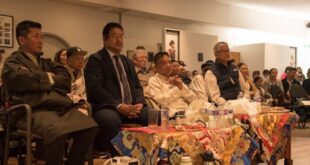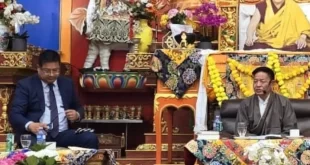Immediate Press Release:
December 15, 2015.
The Central Tibetan Administration welcomes the commitment by the nearly 200 countries at the COP21 meeting to tackle climate change by setting the objective of keeping global temperatures “well below” 2.0C . But warns that a comprehensive understanding of global climate change is impossible without looking at Tibet. Tibet, also known as the roof of the world, is an environmentally strategic area and plays a critical role in addressing climate change.
“The Paris Agreement is a step in the right direction, but it’s only a first step,” says Dicki Chhoyang, the Central Tibetan Administration’s Head of Information and International Relations. “If world leaders are serious about avoiding a global environmental catastrophe, Tibet’s importance to the sustainability of the world’s fragile ecosystem must be recognized.”
Governments, under the Paris Agreement, are called on to “take action to conserve and enhance, as appropriate, sinks and reservoirs of greenhouse gases … including forests.” Tibet has suffered from massive deforestation, contributing to climate change. Tibet’s forests once covered 25.2 million hectares. By China’s own estimates, 80 per cent of Tibet’s forests have been destroyed.
China committed to cap carbon emissions by 2030. Although a welcome announcement, this commitment must not be realized by further damaging Tibet’s environment. China’s proposed expansion of hydropower dams is not the solution.
China has already dammed every major river in Tibet. And more damming is expected. Without proper consultation and impact assessments, these hydropower projects can cause serious, irreversible environmental damage.
Nomadic mobility is key to protecting the world’s dry lands. Unfortunately, China is forcing Tibetan nomads off their lands and into large-scale settlements. To date, more than two million people have been moved. There must be an immediate halt to the forceful removal of Tibetan nomads from their lands and those already resettled should be allowed to return to their pastures.
“Tibetans must have a say on what happens on their lands,” says Dicki Chhoyang. “Tibetan nomads are the expert custodians of their lands and their traditional knowledge must be incorporated into climate mitigation and adaptation practices.”
Although binding language on the protection of human rights was deleted from the final text, the implementation of the Paris Agreement must provide protection for groups on the front lines of the climate crisis, including Tibetans. As the UN High Commissioner for Human Rights said, “Indigenous peoples, migrants, older persons, minorities, children, persons with disabilities, those living under occupation, women and girls” need explicit protection from climate change.
For more information contact:
Name: Tenzin Lekshay or Jamphel Shonu
Cell: +91 8585901465, +91 9882603374
Email: media@tibetbureau.in, tibetpressofficer@tibet.net



